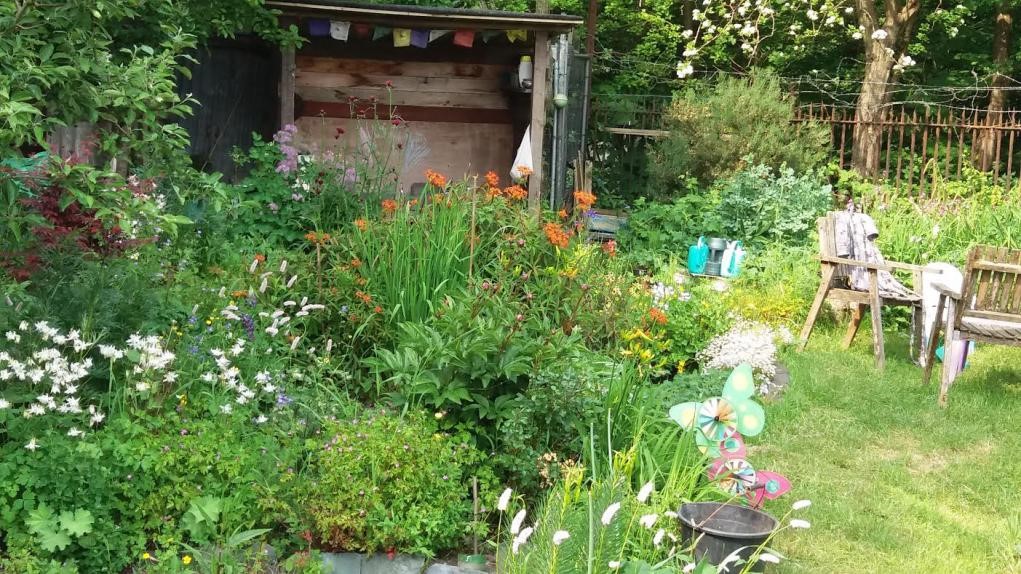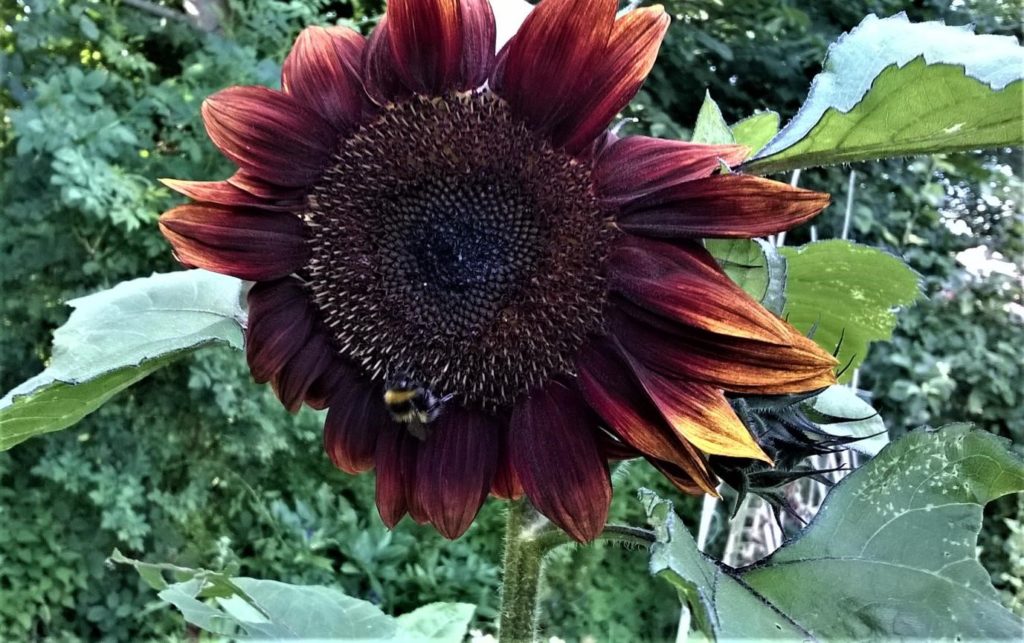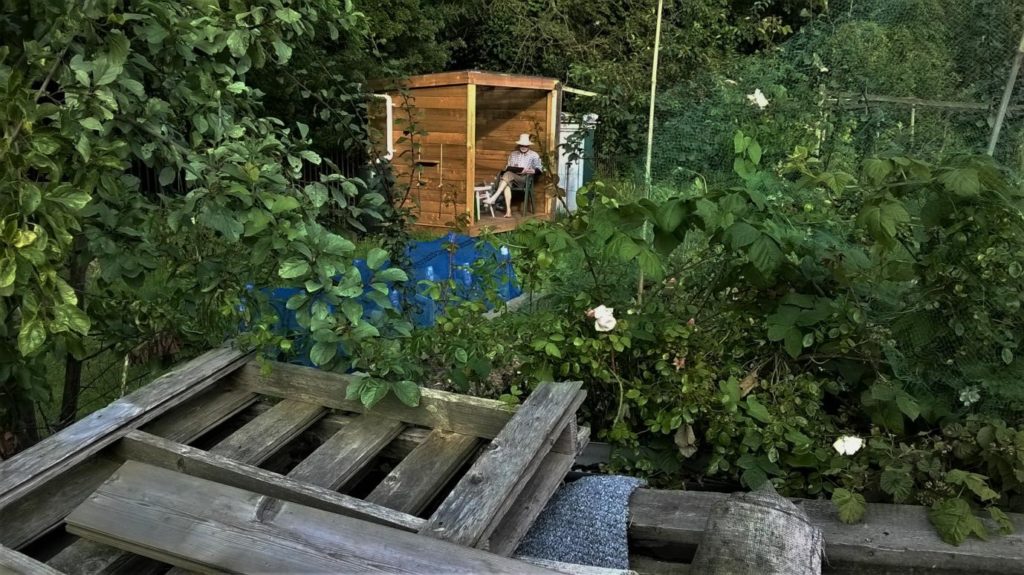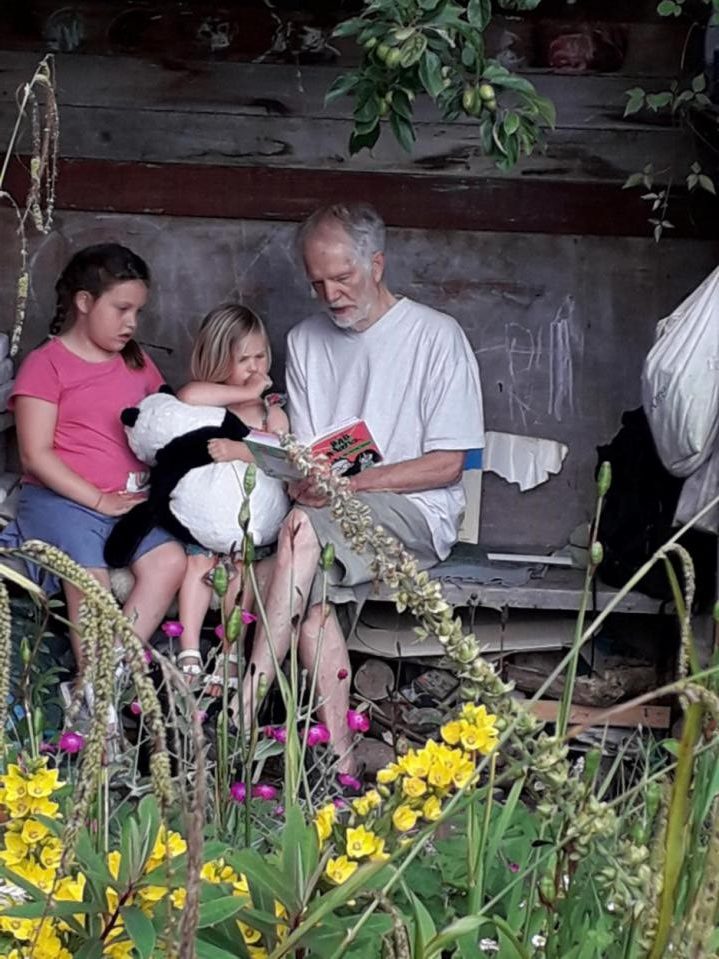One July evening, eight people gathered at Larry Butler’s allotment at Kirklee Allotments, close to the Botanic Gardens in Glasgow. Our purpose was to compose a renga.

A renga is a Japanese form of collaborative poetry, originating from mediaeval times. Some describe it as linked haiku of alternating 5 syllable – 7 syllable – 5 syllable lines, or a three-line haiku followed by two 7-syllable lines.
A renga usually involves nature and place and our relationship to them. Larry, as our Renga Master, had decided that we should create ten stanzas (or hokku). He handed out a template to follow, the bones of which I reproduce here:
- Land/Place/Time (3 lines)
- Season/Weather (2 lines )
- Creatures/Birds/Insects (3 lines)
- Moon (2 lines)
- Commonwealth (3 lines)
- Food (2 lines)
- Play/Games (3 lines)
- Mystery/Longings (2 lines)
- Plants/Flowers/Trees (3 lines)
- Sound or Silence (2 lines)
The way A group collaborates to produce a final version can vary. For instance there is parallel writing: each person doing an agreed part of the whole and then one member compiling it. The way our Renga Master chose for us was for everyone in the group to write their own version of a stanza and then come together to comment on one another’s work and select the best three or two lines, or negotiated compromises between several lines. ‘Renga is a strange wee beastie, it climbs up the stalk of a flower with open paradoxical receptivity and expresses itself in a discipline democratic aesthetic,’ so said James Smith, one of the participants.
Plot 60 was in one corner of the allotments. On the other side of the fence were deciduous woodlands through which sifted a gentle breeze. Somewhere not far away the River Kelvin gently murmured, occasionally joined by cooing pigeons or the shouts and laughter of children at play.
Larry’s allotment contained a little lean-to rain shelter, enough outdoor chairs and a small brazier for burning sticks and garden refuse. A narrow grass path divided the beds in which grew an eclectic mix of plants that had more than a nodding acquaintance with the wild. Raspberries, black currents, blueberries and brambles shared space with beetroot, radish, kale cress, rocket, beans, onions, garlic, rosemary, mint, oregano and parsley. Nasturtiums, marigolds and chrysanthemums grew, not in well ordered rows, but wherever they pleased.

There were beehives and a small lily pond, ‘The Be More Self Less’ (these words carved in a spiral on a stone from Assynt in the centre of the pond) – the abode of newts and frogs. I remember a large sunflower upon whose golden dial buzzed a bumblebee. Even the odd patches of nettles were productive. Larry showed me how to fold the leaves so that the sting was not exposed, then roll them in the palm of your hand before popping the tasty morsel into your mouth.
Larry and Ratnadevi have made a short film, ‘Let’s Get it All in,’ about composting on their allotment. ‘What if nothing has to go to waste?’ asks their commentary. It goes on to say that as well as such things as onion skins, rotten tomatoes and hair clippings, we could recycle and use in a different form all the odds and ends and random thoughts which have passed through our minds. Things like: that line that didn’t make it into the poem; wrong notes while practising a Motzart sonata; unsuccessful grant applications, half-remembered dreams and the unwatched scary scenes from Wallander. The film ends with Larry and Ratnadevi saying, ‘We meet here. We eat here. We dig here. We grow here. We write here. We wonder here and think of you.’ Words like ‘dig’ and ‘grow’ clearly refer to more than the cultivation of plants. Allotment 60 is, indeed, a place for wondering, a good place for a renga.
We sat in a circle, ‘checking in’, gathering our thoughts in silence, preparing our minds for the task ahead. Then, armed with our template and notebooks, we dispersed all over the allotments looking for inspiration and images to fill the first stanza. After ten minutes we reported back to base, each reading out the three lines we had come up with to say something about land, place and time on that summer evening on Kirklee Allotments. ‘I particularly like Anne’s first line,’ Aileen says. ‘And I think we should include Jo’s second line,’ Lois says. ‘I wonder if we could somehow merge Robin’s last line with the similar thought Joelle’s was expressing.’ And so the discussion and trading ebbs and flows until consensus is reached and we have our first stanza. Then we all disperse again to compose eight different versions of the second stanza, each of us bearing in mind that the new stanza must contain a new perception, but must also connect in some way to the previous stanza.

On completing the fifth stanza we took a break for refreshments. The smoking brazier, crackling with twigs, kept the midges at bay. A kettle was boiled on a camping stove. People produced various vegetarian or vegan snacks to share (my wife had made vegan meringues from aquafaba – Italian for ‘bean water’.)
By this time the spirit of a shared creation had seized hold of us. Nobody was pushing their own lines forward over other people’s. We genuinely wanted to produce the best renga possible that would do justice to that summer evening.
The last five stanzas were completed as dusk fell and with us sporting extra layers of sweaters. We read out loud the renga in its entirety, taking a stanza each. And then again. Titles were discussed until one emerged as favourite. A few final tweaks and we pronounced it finished.
Renga do not tell stories in the usual sense. They connect thoughts and images, suggesting an overall picture and mood, For nearly five hours we had been caught up in the excitement of exploring the themes of the renga; of seeing so many ways of interpreting the same material in front of us and how may surprises a collective leap of imagination can produce. We had shared in a creative act which had been a very different experience from those of a single poet. It had been a joyous gathering. Aileen Paterson expressed her appreciation when she wrote: ‘I still remember the feeling of being enclosed and hidden from the rest of the city, even though we could hear other voices around us. I felt safe and protected within a group of understanding people. I loved hearing everyone else’s thoughts and experiences about the space, how we all were drawn to and noticed different things within the allotment. The sharing of food also helped to create a sense of closeness and care for each other as we offered food to each other and chatted. I enjoyed having space to reflect and to wander, even although I was within a group, and the fact that everyone’s input was valued equally. Even where there were differences of opinion these were resolved with consideration for others.’
To organise a successful renga, such as this one, requires a very special talent. It requires a feel for what personalities and poetic talents will blend together into a team. It requires someone who can imbue all present with a spirit of co-operation and generosity, someone who is encouraging and who can make each of us see that I am because we are. Such a person is Larry Butler.
for bliss sake
22nd July 2019
Kirklee allotments
Plot 60
drumbeats nature’s rhythm
evening wood pigeon chimes
we snap sticks to start
fire crackles ash in a barrow
wind goes shhhhhh through the leaves
smoke wards off midges
beetle climbs a bamboo pole
red wings glint sunlight
crescent melon slices
runner beans reach for the moon
allotment abundance
savoured offering on shared ground
no berry the same
cork popping apple & pear
poet’s rhyme in mealtime chat
teens giggle and scream
– the world’s a garden and a game –
they shout “for fuck sake . . . STOP!”
we scatter to search for words
hiding in earth concealed in trees
finding yet more life
summer’s blue sky passes by
lilies close at dusk
with birdsong and river drone
we drift into peaceful night
Participants
Aileen Paterson
Anne MacNamara
James Smith
Joelle Marlowe
Jo Davidson
Larry Butler
Lois Christie
Robin Lloyd-Jones

